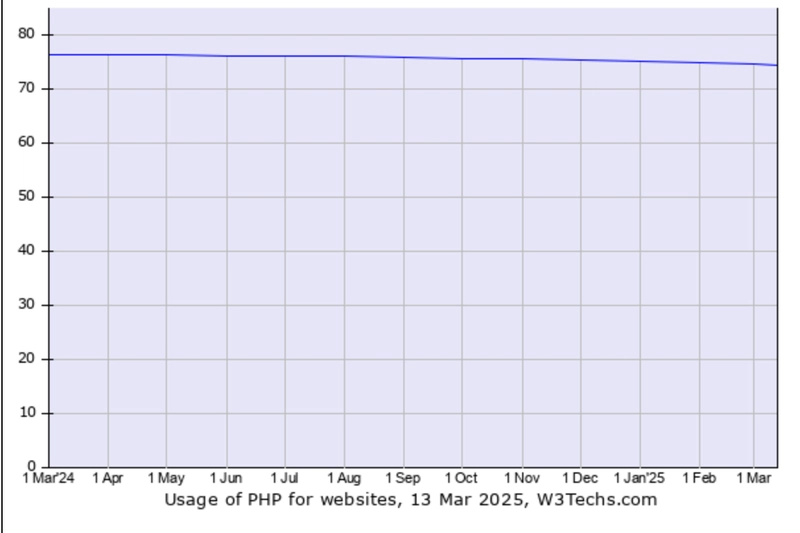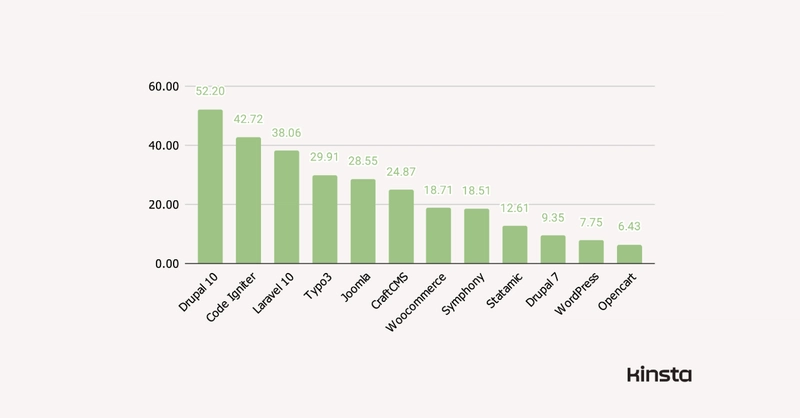Year after year, misconceptions about PHP being dead resurface, but the reality is that PHP continues to evolve. The relevance of any technology is directly tied to its global usage and the community's ongoing contributions to its improvement.
In the ever-evolving landscape of web development, programming languages rise and fade, but PHP has remained resilient. It continues to evolve, adapting to modern web standards. According to W3Techs, PHP powers 74.5% of all known server-side websites, including major platforms like WordPress, which alone runs 43% of all websites on the internet. This enduring dominance is a testament to PHP’s relevance and reliability.

Source:W3Tech
The Evolution of PHP
PHP versions have grown from version 4,5,7,8. Each version comes with its own performance improvements. You can also disprove the false claim that PHP is slow, the latest version of PHP has proven otherwise. Per reports from Kinstart.com, they ran a benchmark to evaluate how the latest version of PHP performs with various CMS and frameworks. PHP8.3 provided up to 52.20% performance boost to the tested CMSs and frameworks.

Source: Kinsta
Recent PHP versions have introduced features like:
- Anonymous classes: It allows you to create class instances without formally defining a class name. They are useful for one-time or temporary object and can pass arguments through to their constructors, extend other classes, implement interfaces, and use traits just like a normal class can.
$obj = new class {
public function sayHelloWorld() {
return "Hello World!";
}
};
echo $obj->sayHelloWorld();
- Just-In-Time (JIT) compilation: This was introduced in PHP 8.0 and it is a hybrid model of interpreted and Ahead-of-Time compilation, whereby some or all of the code is compiled at run time. Primarily, PHP is an interpreted programming language that does not have a compilation step and the code are executed directly in the virtual machine. With this feature, PHP can boast about performance improvements by compiling full or partial part of the PHP application and execute it. JIT can be enabled by adjusting the INI configuration similar to the below code:
opcache.enable=1
opcache.enable_cli=1
opcache.jit_buffer_size=256M
For full list of configuration options, visit Opcache Configuration
Type declarations: In PHP7.4 and above, you can now define types for function arguments, return values, and class properties. Strictly typed code allows PHP to optimize performance at the Opcache and JIT (Just-In-Time) compilation levels, leading to better efficiency and execution speed.
Match expression: This was introduced in PHP 8.0 to provide a more concise and expressive way to handle multiple conditions while ensuring strict comparison (===) by default. Compared to the switch statement, the match expression enables more concise and efficient code.
Example of a switch statement:
$status = 'pending';
$message = '';
switch ($status) {
case 'pending':
$message = 'Your request is being processed.';
break;
case 'approved':
$message = 'Your request has been approved.';
break;
case 'rejected':
$message = 'Your request has been rejected.';
break;
default:
$message = 'Unknown status.';
}
echo $message; // Output: Your request is being processed.
Example of a match expression:
$status = 'approved';
$message = match ($status) {
'pending' => 'Your request is being processed.',
'approved' => 'Your request has been approved.',
'rejected' => 'Your request has been rejected.',
default => 'Unknown status.',
};
echo $message; // Output: Your request has been approved.
- Named arguments: In PHP 8.0, maintaining a long list of arguments in the correct order is no longer necessary with named arguments. And you can also skip multiple optional parameters with ease.
<?php
function paintCar($brand = "Mercedez", $color = "yellow")
{
return "I am painting a $color $brand car.\n";
}
echo paintCar(color: "blue");
?>
In earlier versions of PHP, you had to specify all default arguments, even when modifying only the second parameter
...
echo paintCar("Mercedez", "blue");
- Asynchronous programming: Natively, PHP now allows asynchronous approach with the use of Fibers. It lets you pause and resume functions or sections of a code without blocking your application. Fibers let you run concurrent PHP code unlike the traditional synchronous PHP code, where codes are run from top to bottom. ReactPHP is also an excellent library to write event-driven, asynchronous PHP code.
Cross-platform Application Development
Have you heard about NativePHP?
It’s a framework that enables developers to build native desktop applications using PHP. With support for Windows, macOS, and Linux, it leverages familiar web technologies—HTML, CSS, JavaScript, and PHP—to create cross-platform applications. NativePHP runs on PHP CLI and local servers to render HTML-based interfaces, making desktop app development seamless for PHP developers.
Conclusion
Without further ado, PHP remains a powerful tool for building applications while staying relevant with modern technologies. Frameworks like Wordpress, Laravel, Symfony, NativePHP, and ReactPHP have transformed PHP development, providing robust solutions for creating scalable, efficient, and modern applications.


Top comments (1)
Great read! PHP may not be the shiny new tool, but it’s far from dead. With improvements in performance, frameworks like Laravel, and async capabilities via ReactPHP, it’s clear that PHP is evolving to meet modern development needs.